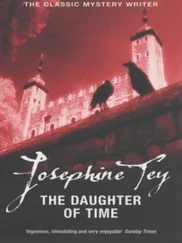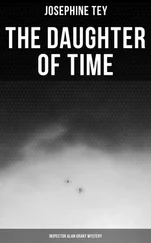A few more hours would have done it. A few more hours in her uninterrupted company, and he would have been involved past recovery. Bill Kenrick had intervened just in time.
It was Pat who saw him first and came to meet him and bring him back to the company as children and dogs do to those of whom they approve. Zoë tilted her head back to watch him come and said: ‘You haven’t missed anything, Alan Grant. No one has had a nibble all day. Would you like to take my rod for a little? Perhaps a change of rhythm will fetch them.’
Grant said that he would like that very much, since his time for fishing was running out.
‘You have still a week to catch everything in the river,’ she said.
Grant wondered how she had known that. ‘No,’ he said, ‘I am going back to London tomorrow morning,’ and for the first time saw Zoë react to a stimulus as an adult would. The instant regret on her face was as vivid as that on Pat’s, but unlike Pat she controlled and removed it. She said in her polite gentle voice how sorry she was, but her face no longer showed any emotion. It was her fairy-tale face again; the Hans Andersen illustration.
Before he could consider this phenomenon, Tad Cullen said: ‘Can I come back with you, Mr Grant? To London.’
‘I meant you to. I’ve booked two seats on the morning plane.’
In the end Grant took the rod that Tad Cullen was using—a spare one from Clune—so that they could go down river together and talk. But Zoë made no motion to continue her fishing.
‘I’ve had enough,’ she said, unjointing her rod. ‘I think I shall go back to Clune and write some letters.’
Pat stood irresolute, still like a friendly dog between two allegiances, and then said: ‘I’m going back with Zoë.’
He said it, Grant thought, almost as if he were championing her instead of merely accompanying her; as if he had joined an Unfair-To-Zoë movement. But since no one could ever think of being unfair to Zoë, his attitude was surely unnecessary.
From the rock where he sat with Tad Cullen to give him the news he watched the two figures grow small across the moor, and wondered a little at that sudden withdrawal, at the dispirited air that hung about her progress. She looked like a discouraged child, tired and trailing homeward unexpectant. Perhaps the thought of David, her husband, had suddenly drowned her. That was the way with grief: it left you alone for months together until you thought that you were cured, and then without warning it blotted out the sunlight.
‘But that wouldn’t be much to get excited about, would it?’ Tad Cullen was saying.
‘What wouldn’t?’
‘This ancient city you’re talking about. Would anyone get all that excited about it? I mean, about a few ruins. Ruins are two a nickel in the world nowadays.’
‘Not these, they aren’t,’ Grant said, forgetting Zoë. ‘The man who found Wabar would make history.’
‘I thought when you said he had found something important you were going to say munition works in the desert or something like that.’
‘Now that really is something that is two for a nickel!’
‘What?’
‘Secret munition plants. No one who found one of those would be a celebrity.’
Tad’s ears pricked. ‘A celebrity? You mean the man who found this place would be a celebrity?’
‘I’ve already said so.’
‘No. You just said he would make history.’
‘True. Too true,’ Grant said. ‘The terms are not synonymous any more. Yes, he would be a celebrity. Tutankhamen’s tomb would be nothing to it.’
‘And you think Bill will have gone to see this fellow, this Lloyd guy?’
‘If not to him, then to someone else in that line. He wanted to talk to someone who would take what he had to tell as a serious matter; I mean, who would not just tease him about seeing things. And he wanted to meet someone who would be personally interested and excited by his news. Well, he would do just what I did. He would go to a museum, or a library, or perhaps even to one of the Information departments at the big stores, and find out who the best-known English explorer of Arabia happened to be. He would probably be given a choice, since librarians and curators are pedantic people and Information departments subject to the law of libel, but Lloyd is head-and-shoulders above the others because he writes almost as well as he explores. He is the household word of the bunch, so to speak. So the chances are twenty to one that Bill would choose Lloyd.’
‘So we find out when and where he saw Lloyd and pick up his trail from there.’
‘Yes. We also find out whether he went to see Lloyd as Charles Martin or under his own name.’
‘Why would he go as Charles Martin?’
‘Who knows? You said that he was a little cagey. He may have wanted to keep back his connection with OCAL. Are OCAL strict about their routes and schedules? It may be as simple as that.’
Cullen sat in silence for a little, making a pattern in the turf with the butt of the fishing-rod. Then he said:
‘Mr Grant, don’t think I’m being dramatic or—or sensational or silly, but you don’t think, do you, that Bill could have been bumped off?’
‘He could have been, of course. Murder does happen. Even clever murders. But the chances against it are very long.’
‘Why?’
‘Well, for one thing it has passed a police investigation. In spite of all the detective stories to the contrary the Criminal Investigation Department really is a highly efficient organisation. By far the most efficient organisation, if you’ll accept a slightly prejudiced opinion, that exists in this country today—or in any other country, in any period.’
‘But the police have already been wrong about one thing.’
‘About his identity, you mean. Yes, but they can hardly be blamed for that.’
‘You mean because the set-up was perfect. Well, what’s to hinder the other set-up being as perfect as the Charles Martin one?’
‘Nothing, of course. Clever murders, as I say, do happen. But it is much easier to forge an identity than to get away with murder. How do you think it was done? Someone came in and slugged him after the train left Euston, and arranged it to look like a fall?’
‘Yes.’
‘But no one visited B Seven after the train left Euston. B Eight heard him come back shortly after the attendant had done his round, and close his door. After that there was no conversation.’
‘It doesn’t need conversation to slug a man on the back of the head.’
‘No, but it does need opportunity. The chances against opening that door and finding the occupant in the right position for slugging him are astronomical. It’s not an easy place to take a swing at anyone, even choosing your own time: a sleeping compartment. Anyone with lethal intentions would have to come into the compartment: it couldn’t be done from the corridor. It couldn’t be done when the victim was in bed. And it couldn’t be done with the victim facing you; and he would face round as soon as he was aware that there was someone in the compartment. Therefore it could only be done after preliminary conversation. And B Eight says there was no conversation or visiting. B Eight is the kind of woman who “can’t sleep on a train”. She makes up her mind about that beforehand, and every little sound and squeak and rattle is welcomed as a sign of her suffering. She is usually dead asleep and snoring by about half-past two; but long before that time Bill Kenrick was dead.’
‘Did she hear him fall?’
‘She heard a “thump”, it seems, and thought that he was taking down a suitcase. He had no suitcase, of course, that would make a thump in being handled. Did Bill speak French, by the way?’
‘Well enough to get by.’
Читать дальше












